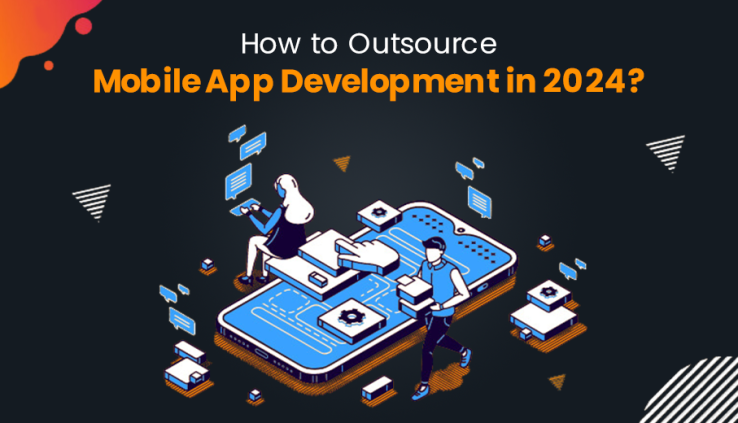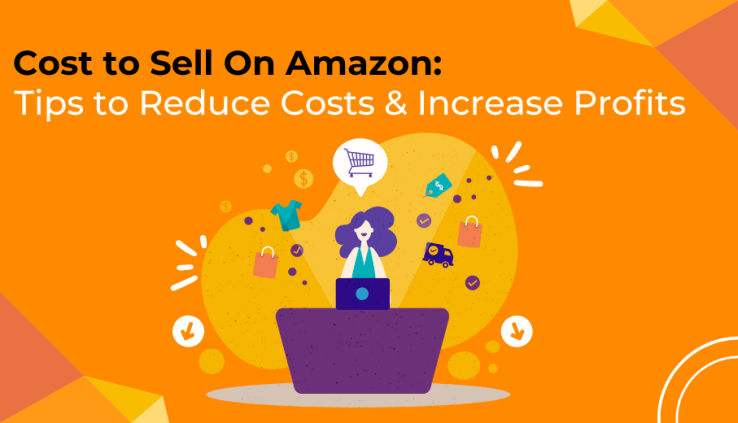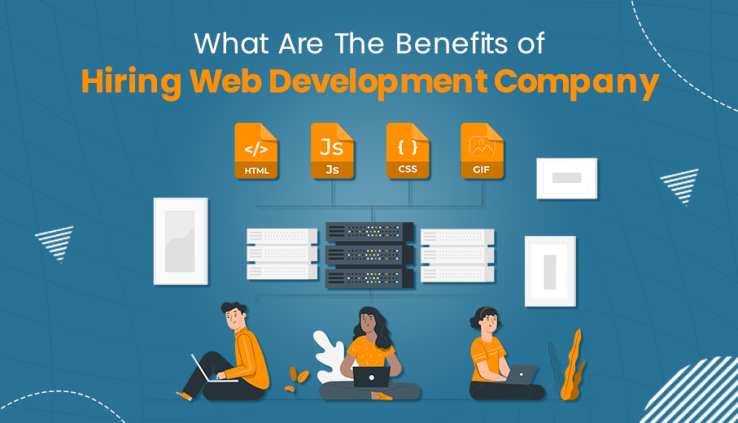In the dynamic landscape of contemporary business, mobile applications have emerged as pivotal tools for achieving success in the online sphere. However, navigating the intricate path from conceptualization to a fully operational mobile app can be intricate and time-consuming. It is where the practice of mobile app development outsource takes center stage. By opting for outsourcing, companies can harness the expertise of skilled professionals while dedicating their resources to core competencies. This article will delve into the most efficient strategies for successfully outsource mobile application development in 2023.
Exploring the Realm of Outsourced Mobile App Development
Outsourcing mobile app development involves enlisting external resources or collaborating with third-party entities to oversee designing, developing, testing, and maintaining mobile applications. Instead of relying solely on an in-house team, businesses utilize the expertise of external professionals or agencies to bring their app ideas to fruition.
The outsourcing partner is responsible for managing the entire app development journey or specific stages, depending on the agreed-upon scope of work. This approach empowers businesses to tap into external talent, control costs, access specialized skills, and maintain their focus on core competencies. At the same time, this approach ensures the timely delivery of high-quality mobile applications. Learn more about mobile application development services and how to use them fully.
A Step-by-Step Guide on How to Outsource Mobile App Development
Follow these steps to proficiently outsource mobile app development and ensure transparent communication, quality adherence, and successful outcomes. Active monitoring, timely feedback, and seamless collaboration are essential for nurturing a productive outsourcing partnership.
Define Your Project Requirements
Begin by meticulously outlining your app development prerequisites. It involves articulating the app’s purpose and objectives, identifying your target audience, specifying desired features and functionalities, choosing the platforms (iOS, Android, or both), setting a practical timeline, and allocating a budget. Precision and thoroughness in your requirements facilitate effective communication of your expectations to potential outsourcing partners.
Conduct Research and Shortlist Potential Partners
Initiate a thorough research process to identify potential outsourcing companies or freelance experts specializing in mobile app development. Give priority to entities with a proven track record and positive client testimonials. Evaluate factors such as their industry experience, the size and expertise of their development team, portfolio showcasing previous projects, and proficiency in technologies relevant to your app.
Evaluate and Select the Right Partner
After compiling a list of potential outsourcing candidates, subject them to a comprehensive evaluation based on critical criteria. Assess their capabilities, reputation, communication skills, cultural compatibility, and pricing models. Request and review their portfolio to determine the quality of their past work and its alignment with your expectations.
Establish NDA and Legal Agreements
Before sharing confidential information about your app concept and project specifics, safeguard your intellectual property by executing a non-disclosure agreement (NDA) with your outsourcing partner. This legally binding contract protects your proprietary information from unauthorized disclosure. Additionally, formalize other essential legal agreements, such as contracts or service arrangements, to clarify terms, responsibilities, and ownership related to the app.
Define Project Scope and Plan
Engage in collaborative efforts with your outsourcing partner to define the project’s scope, milestones, and deliverables. This stage involves providing detailed documentation of your requirements and engaging in comprehensive discussions with the outsourcing team. Establish effective communication channels like email, project management platforms, or chat applications to facilitate seamless interaction and cooperation. Determine the project timeline, development methodology (e.g., agile or waterfall), and any specific project management frameworks to be adhered to.
Facilitate Communication and Collaboration
The cornerstone of successful outsourcing lies in consistent and transparent communication. Develop a robust communication plan with your outsourcing partner, specifying the frequency and interaction methods, whether through regular meetings or daily updates. Leverage project management tools to streamline collaboration and monitor progress. These tools could encompass project management platforms like Jira or Asana, version control systems like Git, and communication tools like Slack or Microsoft Teams. Ensure your outsourcing team remains responsive and provides routine updates on project status.
Adopt Agile Development Methodology
Consider embracing an agile development approach, such as Scrum or Kanban. Agile methodologies promote iterative development and collaboration, allowing constant feedback and adaptability throughout the development journey. This approach empowers you to prioritize features, establish short-term objectives (sprints), and flexibly adapt to evolving requirements and market dynamics.
Prioritize Quality Assurance and Testing
Clearly outline quality assurance (QA) processes and testing requisites with your outsourcing partner. Set up guidelines for identifying and addressing bugs and implementing quality control measures. Define testing methodologies, encompassing unit testing, integration testing, and user acceptance testing. Continuously conduct thorough testing throughout the development lifecycle to promptly address any issues. Encourage your outsourcing partner to conduct comprehensive testing to ensure seamless app functionality across various devices and platforms.
Consistent Review and Feedback
Regularly review the advancements and deliverables provided by your outsourcing partner. Contribute comprehensive assessments of each milestone or phase, delivering prompt and constructive feedback. This practice safeguards that the app remains aligned with your expectations and requisites. Foster open and transparent communication, promptly addressing concerns or challenges as they arise.
Deployment and Ongoing Support
Upon the completion of app development, collaborate with your outsourcing partner to launch the app on respective app stores (such as Apple App Store or Google Play Store). Outline provisions for post-launch support, maintenance, and updates. Establish the required ongoing support and outline protocols for bug fixes, performance enhancements, and feature upgrades. It could entail creating a comprehensive service-level agreement (SLA) that encapsulates ongoing support’s terms and conditions.
Benefits Galore: Why to Choose Outsourced Mobile App Development
The decision to outsource mobile app development yields several advantages for businesses. Some of the key benefits include:
- Cost-Effectiveness: Outsourcing helps businesses access proficient developers from regions with lower labor costs. Which drastically reduces development expenses when compared to maintaining an in-house team.
- Time Efficiency: Leveraging the expertise of experienced developers specializing in app development accelerates the development lifecycle. It often leads to quicker time-to-market for your mobile app.
- Access to Specialized Skills: Outsourcing provides a diverse talent pool of mobile app developers with distinct skill sets. This guarantees that professionals are adept in the specific platforms, programming languages, or technologies your app requires to craft your app.
- Focus on Core Competencies: By entrusting app development to experts, businesses can redirect their energy toward core business functions like strategic planning, marketing, and customer engagement.
- Scalability and Flexibility: Outsourcing equips businesses with the flexibility to scale development resources according to project requirements. It translates to optimal resource allocation and cost efficiency.
- Quality Assurance: Reputed outsourcing entities often house dedicated quality assurance (QA) teams that meticulously test and debug the app before its release, guaranteeing exceptional quality.
- Ongoing Support and Maintenance: Outsourcing partners typically offer post-development support and maintenance services, eliminating the need for an in-house team for long-term app management.
While outsourcing mobile app development presents myriad benefits, selecting a trustworthy partner boasting a stellar track record and positive feedback is vital. A meticulous evaluation of their expertise, communication infrastructure, security protocols, and cultural compatibility is crucial to cultivating a successful and fruitful outsourcing relationship.
Weighing the Scales: In-house vs. Outsourced Mobile App Development
The choice between in-house and outsourced mobile app development hinges on numerous factors. Let’s juxtapose these two approaches:
In-house Mobile App Development
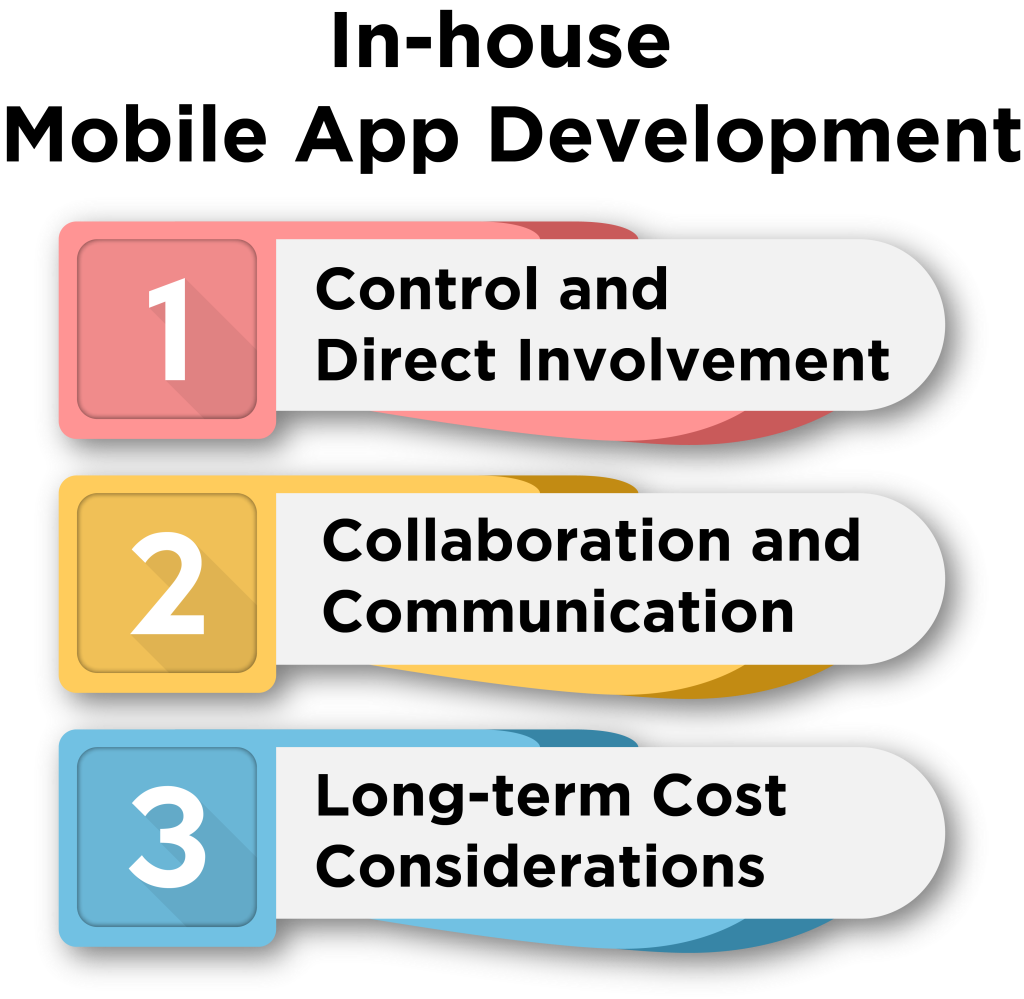
- Control and Direct Involvement: In-house teams offer direct control over the entire app development process, which proves advantageous for companies with unique or specialized app requisites.
- Domain Expertise and Knowledge Retention: Building an in-house team fosters deep domain expertise tailored to your industry or business requirements. This knowledge streamlines communication and decision-making during development.
- Collaboration and Communication: The physical proximity of an in-house team bolsters collaboration and communication, resulting in quicker development cycles and enhanced coordination.
- Long-term Cost Considerations: While in-house development empowers greater control, it can lead to higher expenses due to salaries, benefits, training, and infrastructure costs.
Outsourced Mobile App Development
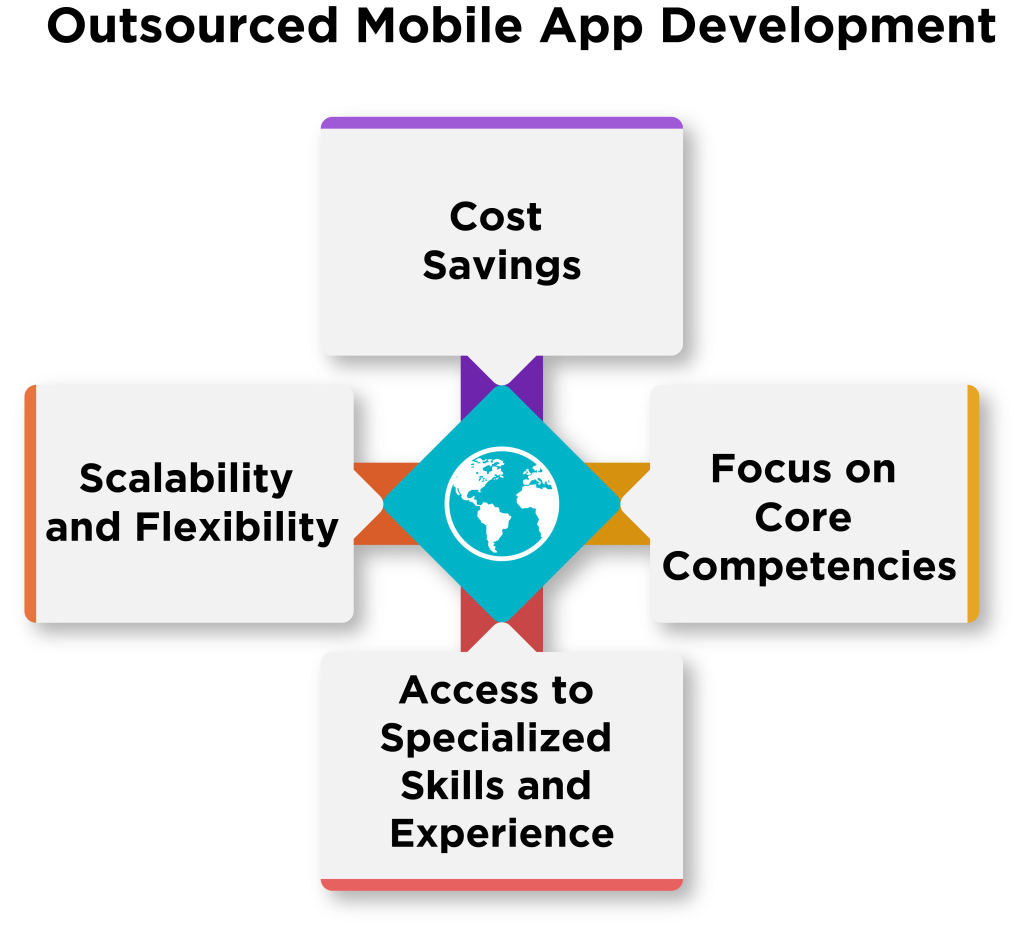
- Cost Savings: Outsourcing taps into skilled developers in regions with lower labor costs, translating to reduced development expenses and eliminating infrastructure and training costs.
- Access to Specialized Skills and Experience: Outsourcing provides Access to a global talent pool, ensuring that professionals with the necessary skills and technologies develop the app.
- Time Efficiency and Faster Time-to-Market: Outsourced developers accelerate development cycles and foster quicker time-to-market due to their expertise in app development.
- Scalability and Flexibility: Outsourcing permits easy resource scaling in response to project demands, ensuring optimal resource allocation.
- Focus on Core Competencies: Outsourcing liberates businesses to concentrate on core functions while leaving app development to the experts.
It’s crucial to note that specific requirements, budget, timeline, and available resources influence the decision between in-house and outsourced approaches. Some companies adopt a hybrid approach, integrating both in-house and outsourced teams to harness the benefits of both models. Ultimately, you must choose by carefully considering your needs, conducting a cost analysis, and formulating a long-term business strategy.
Cost Considerations: Unveiling the Price Tag of Outsourced Mobile App Development
The cost of outsourcing mobile app development is highly variable and influenced by multiple factors. While a ballpark estimate falls between $5,000 and $100,000, it’s essential to recognize that this is a broad range. The actual cost hinges on specific project requisites.
Parameters like the development team’s geographical location, targeted platforms, feature complexity, project timeline, and selected tech stack all contribute to the final cost. More superficial apps with basic functionalities might lean toward the lower end, while more intricate apps with advanced features and integrations could fall toward the higher range.
I recommend consulting potential outsourcing partners for a more precise cost assessment tailored to your project. They can deliver a more accurate and customized cost estimation by furnishing them with comprehensive project specifications.
Conclusion
By adopting a systematic approach, companies can leverage external expertise while concentrating on their core strengths. This process begins with defining project requirements, conducting thorough research, and carefully evaluating potential partners, paving the way for successful outsourcing. Legal agreements safeguard intellectual property, and efficient communication, facilitated by project management tools, ensures effective collaboration. Comprehensive testing and iterative feedback guarantee app quality, resulting in smooth deployment and continuous support. The decision between in-house and outsourced development is influenced by specific requirements, budget, and strategic considerations, with cost as a crucial factor. This guide empowers businesses to confidently navigate outsourced mobile app development, driving their apps toward triumph in the digital arena.
Ready to elevate your mobile app development strategy? Explore the power of HRTECH’s expertise in outsourced app development. Unlock the potential of seamless collaboration, accelerated timelines, and cost-effective solutions. Contact us today to embark on a journey of innovation and success in the digital landscape.

